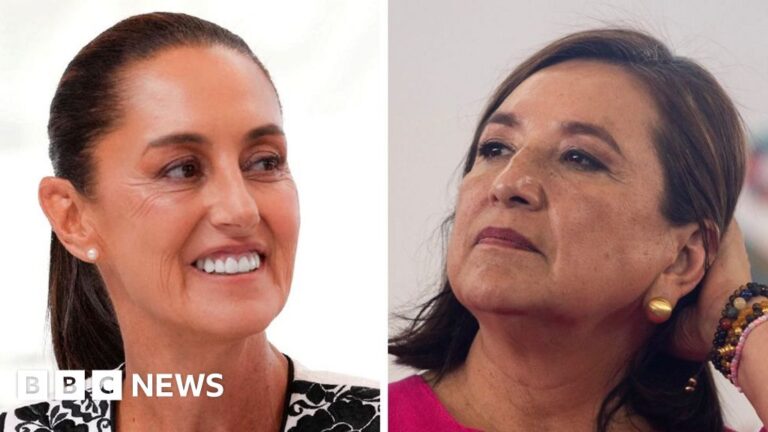- author, Vanessa Buschrüter
- role, BBC News
Mexicans head to the polls on Sunday in an election that is almost certain to elect the country’s first female president.
Front-runner Claudia Sheinbaum and her main rival Xochitl Gálvez are both holding a large lead over the only male candidate, Jorge Álvarez Maínez, in the polls.
Voters also elect all members of Mexico’s Congress, the governors of the eight states, and the head of Mexico City’s government.
The campaign was marked by violent attacks, with more than 20 local candidates killed across Mexico.
Sheinbaum, a 61-year-old scientist who served as Mexico City’s mayor from 2018 to 2023, has the backing of outgoing President Andrés Manuel López Obrador.
Lopez Obrador, who has been in power since 2018, cannot run for the top job again because Mexico’s constitution limits presidential terms to one six-year term.
The popular leader, whose recent polls suggest his approval rating is close to 60 percent, is instead backing Scheinbaum, who is part of his own Morena party.
While many of the promises Lopez Obrador made when he took office remain unfulfilled, his efforts to reduce poverty and support Mexico’s elderly have been well-received by beneficiaries of these social programs.
While the president’s endorsement may have significantly broadened Scheinbaum’s base of support, it also raises questions about how independent she is from a president who sometimes wields enormous power.
Scheinbaum stressed that she is a woman on her own path, but also promised to continue building on Lopez Obrador’s many achievements.
Their party, Morena, boasts that it has lifted millions of Mexicans out of poverty in the past six years.
Morena said the number of people living in poverty has fallen, thanks to policies such as more than doubling the minimum wage.
But economists say other factors are also at play, including increased remittances from Mexicans abroad to friends and family back home.
Chasing Sheinbaum in the election is Senator and businesswoman Xochitl Galvez.
Galvez, 61, was elected by a broad coalition of parties with a common desire to end the rule of the Morena party.
She and her coalition, Strength and Heart for Mexico, have criticized the increase in violence the country has experienced ahead of the elections.
At her closing rally, she told Mexicans that voting for her would give them “the bravest president, the president who will fight crime.”
Galvez has repeatedly criticized President Lopez Obrador’s strategy, which he first implemented in his presidency, promising “hugs, not bullets” in fighting crime, but has offered few details about how he plans to tackle powerful criminal gangs behind the violence ravaging the country.
She says she would increase police pay and invest more in public safety overall.
But her popularity among voters critical of the outgoing president can be attributed to her promises to strengthen institutions that Lopez Obrador allegedly tried to weaken, such as the Constitutional Court and the National Electoral Commission.
Galvez has accused Lopez Obrador of being authoritarian and undermining Mexico’s democratic institutions, calling his administration “arrogant and coercive.”
Whoever wins will take office at the end of September.

